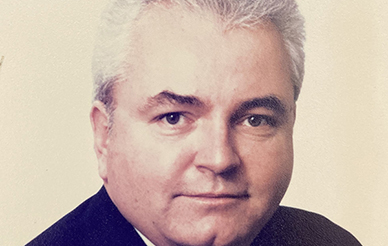Carol Hammond’s Story: A Caregiver Who Keeps Giving
 Leon Hammond was born in a small town in West Virginia and built a family with his wife of 43 years, Carol, and son Paul. He attended the University of West Virginia, reached the rank of captain in the army, and retired as vice president of Seaboard Tampa Terminals. Leon was an avid golfer — so much so, that Carol quipped, “The secret to a happy marriage is to let him golf.”
Leon Hammond was born in a small town in West Virginia and built a family with his wife of 43 years, Carol, and son Paul. He attended the University of West Virginia, reached the rank of captain in the army, and retired as vice president of Seaboard Tampa Terminals. Leon was an avid golfer — so much so, that Carol quipped, “The secret to a happy marriage is to let him golf.”
Leon was never a patient at UC San Diego Health, which is why Carol’s support of UC San Diego Health and the research of Rohit Loomba, MD, MHSc, is so remarkable.
Our story begins in 2016, with Carol. She reached out to Dr. Loomba after reading an article in the San Diego Union-Tribune, which was sent to her from her sister who lived in Fallbrook, California. It outlined his research on nonalcoholic fatty liver disease (NAFLD) and what she described as his “realistic goals” for studying and treating the disease.
Leon had been having health issues with his gallbladder and type 2 diabetes since 2011. As time went on, his liver enzymes and ammonia went up, and he began treating his NAFLD with a low-protein diet. Every meal turned into an accounting of his protein intake, which made dining out next to impossible. Carol became Leon’s primary caregiver.
She described her caregiving experience: “NAFLD is arguably one of the hardest conditions to care for. My husband was great at numbers and could figure out financials at lightning speed, but when ammonia levels are high, he couldn’t balance the checkbook. We had to take his driver’s license away. Piece-by-piece you are losing your identity — and you are fully aware of it. I would have never put him in a home for his final years.”
She began looking for better treatment options that would improve Leon’s quality of life. After reading the San Diego Union-Tribune article, she picked up the phone and cold-called Dr. Loomba to discuss her husband’s condition. Carol recalled being astonished that Dr. Loomba didn’t pass her off to a junior staff member.
“The research being done in San Diego, and our initial conversation, made me feel very confident. Dr. Loomba is always kind, always a great listener, and he understands what patients and families are going through. He always keeps me informed.” – Carol Hammond
Dr. Loomba listened to what she had to say and invited the couple to visit UC San Diego from their home in Tampa. By this stage Leon was not able to make the trip, so Dr. Loomba reached out to Tampa General Hospital to see if Leon would be a fit for their NAFLD clinical trial. Unfortunately, due to his mature age and condition, the position went to someone else, and Leon passed away in 2018.
Even after Leon passed away, Dr. Loomba kept Carol informed about his research, and Carol began supporting Dr. Loomba’s work. “Because of his deep dedication, I feel strongly that Dr. Loomba is the right doctor at the right time, and he will lead the way to find a cure,” Carol says. “It won’t happen overnight, but on the steps along the way, he is going to be the one to do it. I really believe in him. If my donation can even play a small part in improving quality of life for these patients, I will be happy.”
In addition to founding the NAFLD Research Center, Dr. Loomba is also the founding director of the NAFLD Translational Research Unit, which is where the best ideas for treating NAFLD are translated into tangible treatments. The UC San Diego NAFLD Research Center works at the leading-edge of NAFLD investigation. The center’s mission is to develop novel therapies and the best noninvasive modalities for the assessment of treatment response and diagnosis of progressive forms of NAFLD and related fibrosis. At the core of these efforts are the patients, who are critical contributors to the research and are the people who need breakthroughs the most. The impact of the team’s contributions is significant. Since 2005, there have been more than 475 peer-reviewed articles published (Loomba is among the top 1% of highly cited scientists globally), in addition to the care provided and clinical trials to investigate new drugs.
Philanthropic support, like that of Carol Hammond, is often the critical ingredient to progress. There is power in philanthropy because it allows institutions to respond to their greatest needs. UC San Diego is already known as one of the finest programs on Earth — U.S. News & World Report ranks us first in the world for gastroenterology and hepatology (liver) research, and 18th in the nation for gastroenterology care and GI surgery. For our NAFLD research teams, our philanthropic partners offer the tools to better care for our community and the world.
Give now to the UC San Diego Nonalcoholic Fatty Liver Disease (NAFLD) fund.